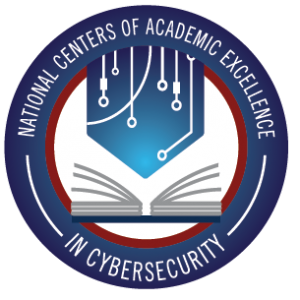Online Bachelor's in Cybersecurity: Digital Forensics and Incident Response

Detect and Deter Cybercrime
100% Online
90 Transfer Credits
Nationally Recognized Program
Accelerated Coursework
Request More Information
Complete this form to receive information about coursework, admissions, tuition, and more.
- Duration 3.5 years
- Cost per Credit $410
- Credit Hours 120
Program Benefits
- No background in IT or computer science required
- Learn to identify and investigate cybercrime
- Access courses on your schedule through an interactive, virtual classroom
- Courses led by experienced and industry-connected faculty
Nationally Recognized
The NSA named Bay Path University a National Center of Academic Excellence in Cybersecurity for Cyber Defense, making us the only women’s university in the country with that certification*
Learn to Lead Cyber Investigations
The online BS in Cybersecurity: Digital Forensics and Incident Response major from The American Women’s College of Bay Path University (TAWC) prepares you for career success by leveraging cutting-edge technology and real-world application. We’ve combined topics from cybersecurity, digital forensics, and incident response to deliver an interdisciplinary learning experience emphasizing the same tools and technology used by current professionals in the field.
Digital Forensics Curriculum
15 major courses
3 credits per course
The online bachelor’s in cybersecurity: digital forensics and incident response degree features lab-based courses to hone your skills in current digital forensics topics. Throughout your program, you’ll gain expertise in forensic acquisition, network intrusions, mobile forensics, insider threat, and more. You’ll also learn to apply security measures that align with the CIA triad of data — confidentiality, integrity, and availability.
The Digital Forensics and Incident Response major can also be taken as a Digital Forensics certificate and applied to any degree program for students interested in further specializing their area of study.
To view the complete list of program courses, visit the program curriculum page.
Required Major Courses
The purpose of this course is to explore the evolving crime phenomenon resulting from the technology revolution over the last 60 years. An examination of the unique human-computer relationship will be conducted to develop an understanding of how criminal activity has adopted the use of new technologies to further their criminal activity. Additionally, a review of social constructs relating to high tech criminal activity will be provided.
This course is designed to introduce and explore the basic concepts of digital forensic investigations and analysis. Students will learn the basic terminology and tools utilized in a digital forensic investigation. Students will broaden their knowledge and understanding of what a digital forensic investigator does and the types of skills needed in this field.
Lab fee: $100
Describes the legal and ethical issues associated with information security including access, use, and dissemination. It emphasizes legal infrastructure relating to information assurance, such as the Digital Millennium Copyright Act and Telecommunications Decency Act, and emerging technologies for management of digital rights. It examines the role of information security in various domains such as healthcare, scientific research, and personal communications such as email. It examines criminal activities such as computer fraud and abuse, desktop forgery, embezzlement, child pornography, computer trespass, and computer piracy.
This course prepares students with the knowledge and skills necessary to utilize forensic software tools to perform and analysis of a variety of digital devices. Students will also learn the role of a digital forensic examiner in both the private and public sector. Students will be introduced to fundamental principles of digital forensics investigations.
Lab fee: $100 | Prerequisite: CBY 200
This course will provide students with the knowledge and skills required to collect and interpret evidence related to network intrusions such as: network traffic, network devices, servers and operating systems. Specifically, students will learn crisis management skills while collecting and analyzing network traffic and protocols.
Prerequisite: CSC 210
This course builds a common cross-disciplinary understanding in the foundations of information assurance. Presents an overview of basic principles and security concepts related to information systems, including workstation security, system security, and communications security. It introduces information security via database technology, discusses legal infrastructure such as DMCA, Telecommunications Act, wire fraud, and other ethical issues. Covers security methods, controls, procedures, economics of cybercrime, criminal procedure, and forensics. It describes the use of cryptography as a tool, software development processes, and protection.
This course prepares students to conduct forensic investigations on Microsoft Windows systems. Students will learn where and how to locate Windows systems artifacts. They will also gain an understanding of the types of evidence associated with a variety of crimes. Students will learn advance concepts such as data carving, live and static filtering, acquisition, and password recovery.
Lab fee: $100
This course provides the knowledge and skills necessary for entry level mobile device examiners to gain a basic understanding of how cellular devices store data, how cellular networks function, collecting evidence and preserving it, methods for radio frequency interruption, troubleshooting connections, verifying results, and the forensic process.
Lab fee: $100
This course prepares students to perform a forensic examination of mobile technologies by examining the process of collection of artifacts from handsets and SIM cards, extraction of physical data from various device types: like IOS and Android, parsing data, searching, bookmarking, visualization, and incorporation of forensic software, export and reporting.
Lab fee: $100 | Prerequisite: CBY 330
This capstone course is designed to provide an opportunity for the student to synthesize, reflect upon, and analyze the complex and robust field of cybersecurity. This course will highlight the major current issues in the field of cybersecurity.
Prerequisite: CBY 202, CBY 301, and CSC 210
In this course, students will be provided a baseline of knowledge of the fundamentals of computers and digital literacies to ensure they will be able to understand a constantly changing technology oriented landscape. In this course, students will be exposed to the fundamentals of computing technology, including computer hardware and software concepts; the Windows operating system and commands; drives, folders, and files; Google’s suite of applications; use of the Internet and growing connectivity with everyday devices; and digital literacy knowledge and skills. By mastering the fundamentals of computing technology and demonstrating digital literacy, students will have the skills needed to thrive in the 21st century workforce.
This course emphasizes technical computing concepts and the development of skills in a technology driven world. It further provides students with skills to perform basic operations involved in system administration, with an understanding of the roles of an operating system, its basic functions, and the services provided by the operating system. An introduction to coding languages is provided. Finally, the course provides students with the ability to create simple scripts/programs to automate and perform simple operations.
The purpose of this course is an in-depth exploration of data security controls and techniques. This course will examine theoretical concepts of network security implementation. This course will examine network security tools and techniques and include hands-on practical applications. Networking has enabled the emergence of mobile and cloud computing, creating one of the most important technological paradigm shifts in computing of the past decade. Coming advancements in wireless networking are expected to transform the technological landscape over the next decade by enabling an endless possibility of new applications, including the Internet of Things and wireless virtual reality, through the emergence of wireless networks with gigabit speeds. In order to play a role in this era of new network-powered advancements, students must have a thorough understanding of emerging networking topics, especially in the wireless domain.
This course introduces a systematic approach to programming. Specifically, this course teaches students to use Python to solve real world problems. By the end of the course, students will be able to construct a program from a series of instructions in Python.
In this course students will apply the practices for effective reading and writing introduced in ENG 114 to the distinctive language and forms of various disciplines. This course lays the foundation for academic and professional research and stresses the use of appropriate and effective information sources. Readings for a variety of academic audiences will provide students with strategies to communicate in the sciences, business and technology, psychology, liberal studies, and the social sciences. Research and documentation skills appropriate to the disciplines are stressed. In addition to leading students through the research process from start to finish, this course will examine the many ramifications of academic honesty.
Prerequisite: ENG 114
The BS in Cybersecurity: Digital Forensics and Incident Response program requires 32 credits of general electives. Learn more about which courses apply to these credits by speaking with an enrollment counselor.
What You’ll Learn
Graduates of the online Bachelor’s in Cybersecurity: Digital Forensics and Incident Response program have the specialized expertise to identify, investigate, and analyze all types of digital crime.
By Graduation, You’ll Have Skills to:
- Demonstrate an understanding of current approaches to detect and/or deter cybercrime, and to investigate incidences related to digital crime activity
- Demonstrate an understanding of digital forensic tools and techniques
- Express an understanding of current issues relating to digital forensics and determine the best practices for attending to them based on available resources, tools, and the overall needs of the organization
Make an Impact in the Fight Against Data Attacks
Cyber attacks are on the rise, with consumers losing an average of $358 per year to online crime1 and an estimated 921 password attacks occurring every second.2 Digital forensics professionals play an essential role in identifying and investigating crimes like these. Excel in a high-growth career path with a bachelor’s degree from TAWC.
- $120,520 median salary for computer network architects3
- $75,262 average salary for forensic computer analysts4
Learn from Industry Experts
At The American Women’s College, your learning is expanded by the rich workplace experience our faculty bring to the classroom. Faculty are professionals who hold an array of titles in the fields they teach. Their involvement in the day-to-day challenges of their role and industry brings curriculums to life with real-world examples as you connect what you learn to what they share.
Faculty Spotlight
Each faculty member at TAWC incorporates real industry experience into each lesson. As a student, you’ll receive personalized, one-on-one support and graduate fully prepared to face the challenges of your chosen field.
Douglas Keevers, EdD, Academic Program Director, Cybersecurity
Prior to joining Bay Path, Dr. Keevers served in academic positions as director of distance education, core faculty, methodologist, university research reviewer, and other academic appointments. Before entering academia, Dr. Keevers worked for IT-centric organizations such as Microsoft and Compaq/Hewlett Packard.
Dr. Keevers holds a Doctorate in eLearning & Instructional Technology from Northcentral University, a master’s degree in information technology management, and post-graduate coursework in business management and information security. He is also certified by the Department of Homeland Security (DHS) and the Federal Emergency Management Agency (FEMA) and holds a certification as a mobile forensics examiner.
Dr. Keevers’ research interests include eLearning, intrinsic motivational theory, and the Internet of Things (IoT). He is also an active member of InfraGard, a joint partnership run by the FBI and the private sector.
Hot Topic: Cybersecurity Career Paths and Specializations Path with Kara Stevens
Please join us for a panel event where cybersecurity leaders will discuss their paths to a career in cybersecurity. They will share their experiences and industry knowledge, and there will be an interactive session where participants can ask questions and network with the panelists.
March 26, 2025 5pm – 6pm
Register HereChoose Your Major
Customize your BS in Cybersecurity program by choosing from three career-focused majors designed to help you achieve your professional goals. In addition to this major, we offer majors in:
Frequently Asked Questions
Explore our frequently asked questions for in-depth answers. If you don’t find what you’re looking for, reach out to us.
While there is no program-specific accreditation for this program, Bay Path University is fully accredited by the New England Commission of Higher Education (NECHE). In addition, Bay Path has been named a National Center of Academic Excellence in Cybersecurity for Cyber Defense through the academic year 2027 for the online BS in Cybersecurity: Digital Forensics and Incident Response major.
We have a rolling admissions policy, so you can apply anytime. Our expert enrollment team can help you choose the start date that’s right for your schedule and academic goals.
Graduates of this program are prepared to take on roles like cybercrime analyst, digital forensics examiner, and digital criminology specialist. Learn more about your career options by visiting the careers page.
Choosing a major for your cybersecurity degree allows you to gain career-ready skills in a specific area of expertise. With these specialized skills, you can stand out to employers and qualify for specialist positions in the field.
While completing the Digital Forensics and Incident Response major, you’ll learn to identify, investigate, and prevent cybercrime using cutting-edge digital forensic tools and techniques.
You can complete the program in just 3.5 years. To see the curriculum, view our courses page.
Tuition is $410 per credit hour. You’ll need to complete 120 credit hours for a total tuition of $49,200. You can review all tuition costs on the tuition page.
Sources and Disclaimer
- Cybersecurity Infrastructure & Security Agency. “Be Cyber Smart: The Facts.” Retrieved from https://www.cisa.gov/secure-our-world.
- Microsoft. Digital Defense Report 2022. Executive Summary. Retrieved from https://query.prod.cms.rt.microsoft.com/cms/api/am/binary/RE5bcRe?culture=en-us&country=us.
- U.S. Bureau of Labor Statistics. Occupational Outlook Handbook. “Computer and Information Technology Occupations.” Retrieved from https://www.bls.gov/ooh/computer-and-information-technology/home.htm.
- Payscale. “Average Forensic Computer Analyst Salary.” Retrieved from https://www.payscale.com/research/US/Job=Forensic_Computer_Analyst/Salary.
*Certification only applies to Digital Forensics and Incident Response major.

